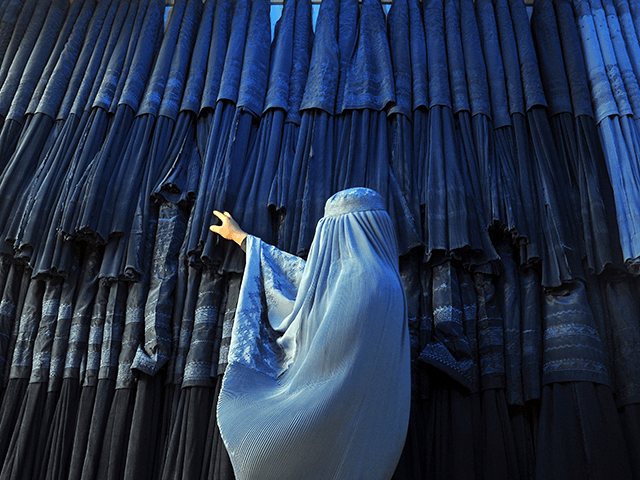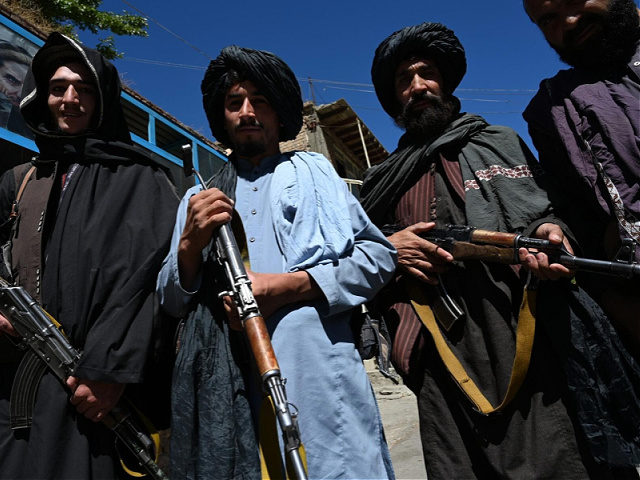The Afghan outlet Tolo News reported on Wednesday that transgender people in the country are facing heightened fear of brutal violence under the Taliban rule, detailing the story of one person beaten and burned by a gang of attackers.
Abdul Sabor Husseini, who the broadcaster identified as a “transgender person,” told Tolo News that “unknown individuals” staged a gang beating that began after Husseini refused to engage in sexual relations with them.
“They were three people, and their faces were covered. They beat me and I was screaming and then I was unconscious,” Husseini told the outlet, adding that “the attackers burned his feet,” according to Tolo. Husseini added that the attack was the second in as many years.
“I don’t know why and for how long I will be facing these problems. They beat us and insult us,” Husseini lamented.
Transgender Person Attacked by Unknown Individuals in Herat#TOLOnews https://t.co/iUF8ZdbNRF
— TOLOnews (@TOLOnews) December 29, 2021
The incident occurred in Herat, western Afghanistan, where Tolo News noted transgender people had long complained of a “lack of protection” from gang attacks and general street harassment.
Complicating matters is the return of the Taliban jihadist government in Kabul. The Taliban took over the city in August as a result of President Joe Biden breaking an agreement that Washington had made with the terrorists last year. Under President Donald Trump, the Taliban had agreed not to attack foreign forces or maintain ties with jihadist groups such as al-Qaeda if the American military fully withdrew from the country by May 1, 2021. Biden chose to break the agreement and extend the 20-year Afghan civil war, inviting a nationwide campaign on the Taliban’s part that saw tens of thousands of attacks and, often, the bloodless surrender of Afghan forces in major cities. By August 15, the Taliban simply walked into Kabul as former President Ashraf Ghani packed up millions in cash and fled the country.
The Taliban initially announced that it had changed since its brutal rule in the 1990s, characterized by regular public executions and extreme beatings and torture of women, suspected LGBT people, and anyone whose behavior authorities classified as anti-Islamic. While asserting they would implement Sharia, or Islamic law, nationwide, Taliban jihadists promised an “inclusive” government. That “inclusivity” – which the Taliban never implemented, as all major government positions are currently in the hands of Taliban terrorists – never included LGBT people.
“LGBT … That’s against our Sharia law,” Taliban “finance ministry” spokesman Ahmad Wali Haqmal told Reuters in October.

A woman clad in a burqa looks at other pieces of Afghanistan’s traditional, all-encompassing dress at a store in Mazar-i Sharif, north of Kabul, Afghanistan, Thursday, Sept. 10, 2015. (AP Photo/Mustafa Najafizada)
Reports rapidly surfaced of incidents of violence against LGBT Afghans and those suspected of being so following the Taliban’s return to power, many at the hands of suspected low-level Taliban terrorists. In Kabul, a gay man identified by the pseudonym Hanan was among the many reportedly targeted by suspected Taliban jihadists through false solicitations for a meeting. ITV News reported that “Hanan” had been desperately seeking to connect with anyone who could guarantee his exit from the country in the aftermath of the Taliban taking Kabul when Taliban jihadists contacted him, claiming they could help him if they met.
“Two people raped him, they beat him, and then demanded his father’s number so they could tell him his son was gay,” according to ITV.
The organization Rainbow Railroad, which helps LGBT people escape deadly conditions in repressive countries, confirmed in November to France 24 that Afghans had notified it that people unrelated to the organization were pretending to be so and offering to help them acquire passports and visas, a report consistent with stories like Hanan’s. Kimahli Powell, the executive director of Rainbow Road, told France 24 that the organization had reason to believe the Taliban had compiled a “kill list” of LGBT Afghans using requests from abroad to get them out.
“[Some] individuals who have reached out to us have told us about how they’ve received a mystery email from someone claiming to be connected with Rainbow Railroad asking for their information and passport,” Powell said at the time. “That’s how we know the information has been leaked.”
LGBT people stuck in the country have told international outlets that they fear they have no way to continue living normally under the Taliban.
“I am terrified. It’s like a nightmare. I don’t feel safe even in my room. I’m scared of the Taliban,” a transgender person identified as Laila told the Guardian in September. “When I see them I feel they will know who I am and they will come to beat me, kick me or send me to prison.”
The outlet documented growing terror among LGBT people that any unknown phone call or email could be Taliban jihadists attempting to target and attack them.
Afghanistan was not hospitable to LGBT people – outside of those practicing the child rape tradition of bacha bazi – under the U.S.-backed government. Afghanistan was an Islamic republic governed under sharia where homosexuality was a crime. Under the Taliban, however, any LGBT identity is punishable by death.
Biden promised to prioritize LGBT rights if elected president while campaigning last year.
“Hate and discrimination against LGBTQ+ people started long before [former President Donald] Trump and [former Vice President Mike] Pence took office,” Biden’s official campaign websites reads. “Defeating them will not solve the problem, but it is an essential first step in order to resume our march toward equality.”
Biden promised to withhold funding to countries that persecute gay people as a candidate and has appointed several LGBT officials in the White House, most prominently Transportation Secretary Pete Buttigieg. In February, he signed a memorandum “directing all U.S. government departments and agencies engaged abroad to ensure that U.S. diplomacy and foreign assistance promote and protect the human rights of lesbian, gay, bisexual, transgender, queer, and intersex (LGBTQI+) persons around the world.”
As president, Biden’s State Department posted pro-LGBT messages online through its now-shuttered Kabul embassy.

COMMENTS
Please let us know if you're having issues with commenting.